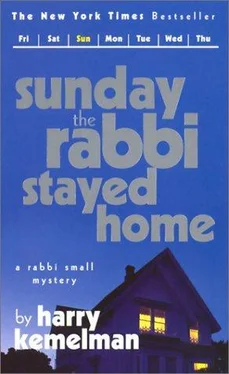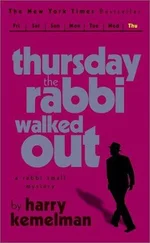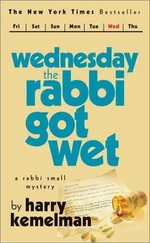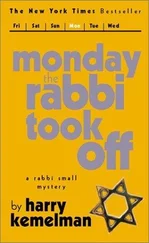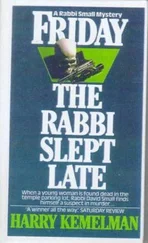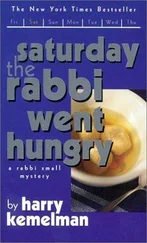Harry Kemelman - Sunday the Rabbi Stayed Home
Здесь есть возможность читать онлайн «Harry Kemelman - Sunday the Rabbi Stayed Home» весь текст электронной книги совершенно бесплатно (целиком полную версию без сокращений). В некоторых случаях можно слушать аудио, скачать через торрент в формате fb2 и присутствует краткое содержание. Город: New York, Год выпуска: 2002, ISBN: 2002, Издательство: iBooks, Жанр: Иронический детектив, на английском языке. Описание произведения, (предисловие) а так же отзывы посетителей доступны на портале библиотеки ЛибКат.
- Название:Sunday the Rabbi Stayed Home
- Автор:
- Издательство:iBooks
- Жанр:
- Год:2002
- Город:New York
- ISBN:978-0743452380
- Рейтинг книги:3 / 5. Голосов: 1
-
Избранное:Добавить в избранное
- Отзывы:
-
Ваша оценка:
- 60
- 1
- 2
- 3
- 4
- 5
Sunday the Rabbi Stayed Home: краткое содержание, описание и аннотация
Предлагаем к чтению аннотацию, описание, краткое содержание или предисловие (зависит от того, что написал сам автор книги «Sunday the Rabbi Stayed Home»). Если вы не нашли необходимую информацию о книге — напишите в комментариях, мы постараемся отыскать её.
Sunday the Rabbi Stayed Home — читать онлайн бесплатно полную книгу (весь текст) целиком
Ниже представлен текст книги, разбитый по страницам. Система сохранения места последней прочитанной страницы, позволяет с удобством читать онлайн бесплатно книгу «Sunday the Rabbi Stayed Home», без необходимости каждый раз заново искать на чём Вы остановились. Поставьте закладку, и сможете в любой момент перейти на страницу, на которой закончили чтение.
Интервал:
Закладка:
“Didn’t it occur to you that this party you were supposed to meet might also be late? I’m surprised you didn’t wait a while.”
Paff shrugged. “Originally there were four of us supposed to meet. So first one calls and tells me he can’t make it.
And then another calls, and he can’t make it. So I was bothered to begin with—you know, disgusted—and I half had the feeling that the third one would have begged off if he could have reached me in time. So like I said, it was raining and there was thunder and lightning, so I thought. What the hell, two of them have disappointed me, so I’ll disappoint a little on my end. Good tiling, too. It turns out when I got home and called him, he said he thought he had a cold coming on and wasn’t about to go out in that kind of weather.”
“Well, that’s clear enough.” said Jennings, closing his notebook. “However, just to get things all cleared up. I’d appreciate it if you’d come down to the station house and make a statement.”
“So what do you call this?”
“Oh, I mean a regular statement that a stenographer can take down and you can sign.”
“Well…”
“It won’t take long, maybe half an hour or so.” Jennings assured him.
“All right, I’ll drop by in the morning—”
“I think the chief would like to have it tonight.”
“You mean right now?”
“Why not? You’re dressed. I can drive you down in ten minutes, and I’ll bring you back afterward.”
Paff was reluctant, but he could think of no reason to refuse. “Well, all right,” he said, “I’ll just tell my wife, and I’ll put on a pair of shoes. I don’t suppose I need to wear a tie,” he added with feeble humor.
“Beauty,” said Jennings appreciatively.
Paff headed for the door, then stopped. “Say, what happened down there? Was the place broken into, or—?”
“Why do you think that?” asked Jennings quickly. “Well, I understand it happened once before.”
Jennings nodded. “Yeah, it was broken into again, but this time it was a little more serious. Someone was found dead there. An employee of yours, as a matter of fact,” he added placidly.
Chapter Forty
I hate to say it to a man of the cloth…”
“I’m not a man of the cloth.”
“… but you’ve got an awful nerve. Rabbi. These kids tell me they find one of their friends murdered, and you ask me to let them go.”
“Why not?”
Lanigan ticked off the points on his fingers. “First, because they’re guilty of breaking and entering—”
“Not Stu Gorfinkle.”
“He did the second time.”
“The door was ajar.”
“Let’s not quibble. Rabbi. So it’s illegal entry. Second, they were present in the same room with someone who had narcotics in his possession.”
“They didn’t know that.”
“The law doesn’t differentiate—not here in Massachusetts, it don’t. Third, they were present in the same house where a man was murdered. Fourth, they could have committed the murder. And fifth, they did not report it to the proper authorities. And you ask me to release them!” Lanigan’s face was red with indignation.
“Yes, I ask you to release them,” he said soberly. “These are not vagabonds; they are respectable children of respectable parents, residents of this town. If you need them for questioning, they will be available. They are obviously guilty of the breaking and entering charge—they admit it, even though it’s fully understandable in view of the storm. Still, if you should decide to prosecute them on that charge, they will appear. As for the narcotics charge, it is based on a law which obviously was never intended to be taken literally—would you arrest everyone on a streetcar, for example, if one passenger was carrying narcotics? No, it is intended to enable you to prosecute someone you have reason to believe is involved in narcotics, even though the actual possession may be with a companion. Are you suggesting that while they were waiting for transportation home they were smoking this drug?”
“And the murder?”
“That they didn’t report it immediately—that was wrong of them but I think understandable. They’re youngsters, and they were worried about what they should do. They were aware that suspicion could fall on them, and they wanted to discuss it among themselves—not whether to report it or not, but how. If you honestly think that one of them, or all of them, were actually involved in the murder, then again, they will be available for questioning.” He smiled. “In the past, you have been receptive to suggestions that I have made that are based on Talmudic law—”
“You going to try to hornswoggle me with that pil—what do you call it?”
“Pilpul? No, but there is the principle of miggo.”
“I don’t think you ever tried that one on me before. How does it go?” asked Lanigan, interested in spite of himself.
“You might call it a principle of inferring credibility. The rabbi would use it when sitting in judgment. It is based on the general psychological principle that a man will not plead to a greater crime if a lesser or more advantageous plea is available to him, for ‘the mouth that bound is the mouth that loosed.’”
“I don’t get it.”
“Let me give you a classic example. A marriageable woman coming from a distant land to a place where she is not known says that although she had been married, she is now divorced and free to marry again. She is to be believed both as to the marriage and the divorce, since she could easily have said that she had never been married at all and have no questions raised about her status.”
“All right, and how does it apply here?”
“Once the youngsters unwrapped the body, there was no evidence that a murder had been committed. They could have remained silent, and you would have assumed that it was a natural death. After all, there were no marks visible on the body. But they made no attempt to conceal what they found. They told you, and so I say that under the principle of miggo, they are to be believed both on their testimony and on their innocence.”
Lanigan rose from his chair and paced the floor while the rabbi maintained a watchful silence. Finally, he stepped in front of the rabbi and spread his hands in exasperation. “What do you want me to do. Rabbi? I called their parents and not one of them was home. The girl says her folks are at a movie; she doesn’t even know which one. You want me to call all the local movie houses and have them paged? That Gorfinkle boy, he finally told me his folks were at his aunt’s house, but when I called, they had left. And Mr. and Mrs. Jacobs—why, they’re in Boston at some party. He doesn’t know the name of the people—or he says he doesn’t. You know I can’t let them go until I get hold of their parents. They’re minors.”
“You’ll be better off to let them go home. If you wait until their parents get here, this place will be a madhouse of hysterical parents and whatever lawyers they managed to bring along with them. There will be accusations and recriminations, and worst of all, the town will be full of rumors tomorrow morning that not only will do a great deal of harm to a lot of innocent people, but will make your investigation ten times as complicated and ten times as difficult.”
Lanigan shook his head stubbornly. “If one of those kids turned out to be guilty and I let him get away when I had him right here in my own station house—” He broke off to ask a patrolman who had entered and was trying to catch his eye, “What is it, Tony?”
“Can I talk to you for a minute, Chief?” The two withdrew to a corner of the room, where the patrolman whispered to him earnestly for several minutes. The chief asked him a question and got a muttered reply. Then, with a “Thanks, Tony, that’s a real help,” he rejoined the rabbi.
Читать дальшеИнтервал:
Закладка:
Похожие книги на «Sunday the Rabbi Stayed Home»
Представляем Вашему вниманию похожие книги на «Sunday the Rabbi Stayed Home» списком для выбора. Мы отобрали схожую по названию и смыслу литературу в надежде предоставить читателям больше вариантов отыскать новые, интересные, ещё непрочитанные произведения.
Обсуждение, отзывы о книге «Sunday the Rabbi Stayed Home» и просто собственные мнения читателей. Оставьте ваши комментарии, напишите, что Вы думаете о произведении, его смысле или главных героях. Укажите что конкретно понравилось, а что нет, и почему Вы так считаете.
